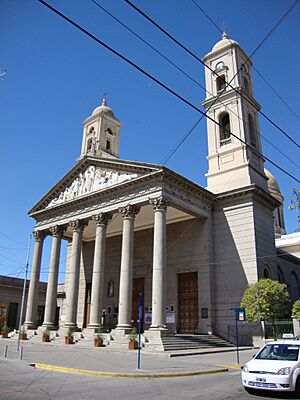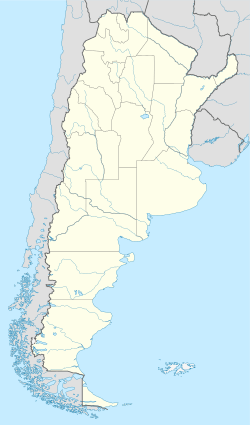San Luis, Argentina facts for kids
Quick facts for kids
San Luis
|
||
|---|---|---|

Cathedral of San Luis
|
||
|
||
| Country | ||
| Province | ||
| Department | Juan Martín de Pueyrredón | |
| Founded | August 25, 1594 | |
| Elevation | 709 m (2,326 ft) | |
| Population
(2010 census)
|
||
| • Total | 169,947 | |
| Demonym(s) | puntano/a | |
| Time zone | UTC−3 (ART) | |
| CPA base |
D5700
|
|
| Dialing code | +54 0266 | |
San Luis is a major city in Argentina. It is the capital of the San Luis Province. This city is located in the Cuyo region of Argentina. It is also the main city of the Juan Martín de Pueyrredón Department.
Contents
What to See and Do in San Luis
San Luis has many interesting places to visit. You can explore the Park of the Nations. The city also has a beautiful neoclassical cathedral. This type of building uses styles from ancient Greece and Rome.
There are several museums in San Luis. One popular museum is the Dora Ochoa De Masramón Provincial Museum. You can also see examples of old colonial buildings. These buildings show how people lived long ago.
Many places in San Luis honor the Argentine War of Independence. This was a time when Argentina fought to become a free country. Independence Park has a statue of General José de San Martín. He was a very important leader who helped Argentina, Chile, and Perú become independent.
Nearby, Pringles Plaza honors Colonel Juan Pascual Pringles. He was one of San Martín's main helpers. Colonel Pringles was also briefly the Governor of San Luis Province.
If you enjoy nature, you can go fishing in Lake Potrero de los Funes. This lake is close to the city. The Sierra de las Quijadas National Park is also nearby. It is about 122 kilometers (76 miles) from San Luis.
Getting Around San Luis
San Luis is connected to other cities by roads. National Route 7 links San Luis to Mendoza. Mendoza is about 255 kilometers (158 miles) to the west. This route also connects San Luis to Buenos Aires. Buenos Aires is about 791 kilometers (492 miles) to the east.
The San Luis Airport is very close to the city center. It is less than 2 miles (3.2 kilometers) north of downtown. You can find regular flights from this airport to Buenos Aires.
History of San Luis
San Luis was first started on August 25, 1594. It was founded by a person named Luis Jufré de Loaysa y Meneses. However, the first settlement was later left empty.
The city was started again in 1632. This time, it was by Martín García Oñez de Loyola. He named it San Luis de Loyola Nueva Medina de Río Seco.
By the late 1800s, San Luis had about 7,000 people. In 1882, a railway line reached the city. This railway was on its way to Chile. The next year, work began on the city's main cathedral. The Governor's Executive Building was finished in 1911. It was designed in a beautiful French style.
The city grew very quickly after 1960. Its population reached 40,000 people that year. Many new businesses, like light industries, moved to the area. Also, more retired people started to live there. By the year 2001, San Luis had 153,322 residents.
The city is located at a place called Punta de los Venados. This means "Deer Point" in Spanish. Because of this, the people who live in San Luis are called puntanos.
Geography and Climate
San Luis is located at the bottom of the Sierras Grandes mountains. It sits on the north side of the Chorrillos River. The city is on a dry flat area called a dry pampas plateau. It is about 730 meters (2,395 feet) above sea level.
San Luis Climate
San Luis has a climate that is mostly humid subtropical. This means it has hot and humid summers. Winters are cool and dry. Sometimes, temperatures can drop below 0°C (32°F). It can even snow sometimes.
January is the hottest month. Its average temperature is about 24.0°C (75.2°F). July is the coldest month. Its average temperature is around 8.9°C (48.0°F). The average temperature for the whole year is about 17.4°C (63.3°F).
| Climate data for San Luis (Brigadier Mayor César Raúl Ojeda Airport) 1991–2020, extremes 1901-present | |||||||||||||
|---|---|---|---|---|---|---|---|---|---|---|---|---|---|
| Month | Jan | Feb | Mar | Apr | May | Jun | Jul | Aug | Sep | Oct | Nov | Dec | Year |
| Record high °C (°F) | 42.0 (107.6) |
39.9 (103.8) |
38.5 (101.3) |
34.7 (94.5) |
32.4 (90.3) |
30.1 (86.2) |
32.2 (90.0) |
34.6 (94.3) |
37.6 (99.7) |
40.0 (104.0) |
41.1 (106.0) |
42.3 (108.1) |
42.3 (108.1) |
| Mean daily maximum °C (°F) | 31.6 (88.9) |
30.0 (86.0) |
27.6 (81.7) |
23.3 (73.9) |
19.6 (67.3) |
17.1 (62.8) |
16.7 (62.1) |
19.5 (67.1) |
22.4 (72.3) |
25.6 (78.1) |
28.5 (83.3) |
30.8 (87.4) |
24.4 (75.9) |
| Daily mean °C (°F) | 24.8 (76.6) |
23.2 (73.8) |
21.1 (70.0) |
16.9 (62.4) |
13.2 (55.8) |
10.3 (50.5) |
9.6 (49.3) |
12.2 (54.0) |
15.3 (59.5) |
18.9 (66.0) |
21.8 (71.2) |
24.0 (75.2) |
17.6 (63.7) |
| Mean daily minimum °C (°F) | 18.3 (64.9) |
17.2 (63.0) |
15.5 (59.9) |
11.8 (53.2) |
8.3 (46.9) |
5.0 (41.0) |
4.0 (39.2) |
6.2 (43.2) |
9.1 (48.4) |
12.5 (54.5) |
15.1 (59.2) |
17.3 (63.1) |
11.7 (53.1) |
| Record low °C (°F) | 4.1 (39.4) |
3.9 (39.0) |
2.0 (35.6) |
−2.4 (27.7) |
−6.5 (20.3) |
−9.1 (15.6) |
−10.5 (13.1) |
−8.7 (16.3) |
−4.3 (24.3) |
−4.0 (24.8) |
0.3 (32.5) |
1.6 (34.9) |
−10.5 (13.1) |
| Average precipitation mm (inches) | 115.3 (4.54) |
112.5 (4.43) |
92.1 (3.63) |
44.8 (1.76) |
18.6 (0.73) |
5.4 (0.21) |
5.4 (0.21) |
8.6 (0.34) |
22.0 (0.87) |
50.1 (1.97) |
87.4 (3.44) |
104.9 (4.13) |
667.1 (26.26) |
| Average precipitation days (≥ 0.1 mm) | 9.7 | 8.5 | 7.9 | 5.6 | 3.6 | 1.9 | 2.2 | 2.0 | 3.9 | 6.1 | 8.1 | 9.6 | 69.2 |
| Average snowy days | 0.0 | 0.0 | 0.0 | 0.0 | 0.1 | 0.1 | 0.5 | 0.3 | 0.1 | 0.0 | 0.0 | 0.0 | 1.1 |
| Average relative humidity (%) | 52.9 | 58.1 | 62.7 | 64.9 | 66.2 | 62.0 | 56.1 | 47.6 | 45.5 | 47.8 | 48.5 | 49.7 | 55.2 |
| Mean monthly sunshine hours | 331.7 | 276.9 | 257.3 | 216.0 | 195.3 | 207.0 | 213.9 | 232.5 | 243.0 | 279.0 | 312.0 | 341.0 | 3,105.6 |
| Mean daily sunshine hours | 10.7 | 9.8 | 8.3 | 7.2 | 6.3 | 6.3 | 6.9 | 7.5 | 8.1 | 9.0 | 10.4 | 11.0 | 8.5 |
| Percent possible sunshine | 73 | 75 | 68 | 68 | 64 | 62 | 65 | 71 | 67 | 73 | 72 | 71 | 69 |
| Source 1: Servicio Meteorológico Nacional | |||||||||||||
| Source 2: NOAA (percent sun 1961-1990), Secretaría de Minería (extremes 1901-1960) | |||||||||||||
Images for kids
Notable People from San Luis
Many interesting people have come from San Luis. Here are a few:
|
|
See Also
 In Spanish: San Luis (Argentina) para niños
In Spanish: San Luis (Argentina) para niños
 | Tommie Smith |
 | Simone Manuel |
 | Shani Davis |
 | Simone Biles |
 | Alice Coachman |







